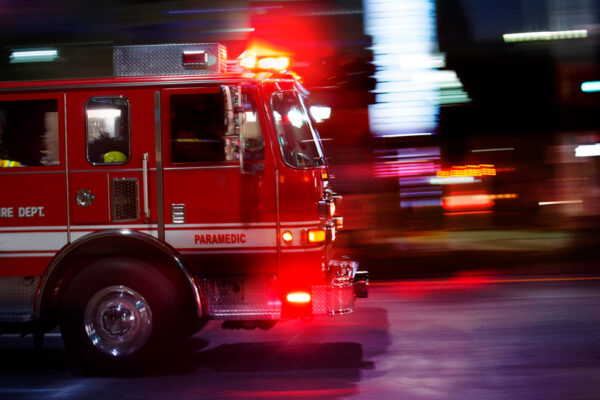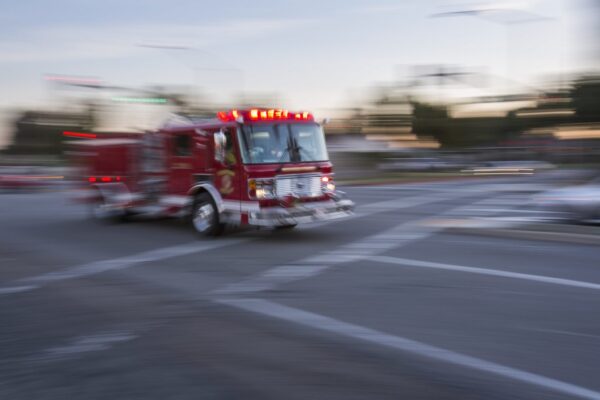
When you see a large vehicle weaving its way at high speed through the lanes, you might consider calling the police to report it. But what if the speeding vehicle is operated by the city? This is a common question for those involved in a fire truck accident or a collision with other types of government vehicles.
Fire truck accidents are very different from typical truck accidents. By default, the city represents the crew and fire truck. Once the city is involved in an accident, filing a claim can get tricky, especially when it involves emergency responders. For instance, there may be unique legal issues not normally found in most accidents, such as a government provision that protects the city called “sovereign immunity.”
However, each accident is unique; the validity of a claim depends on the cause of the accident and how a state provides legal remedies for victims.
Common Causes of Fire Truck Accidents
Fire trucks can often be the largest vehicles on the road. By law, these vehicles may drive at any speed deemed necessary to reach the emergency scene. It is not unusual for those speeds to exceed 75 miles per hour. Collisions with such large trucks can cause severe injuries, including broken bones and traumatic brain injury (TBI).
While motorists around the nation know it’s their responsibility to pull to the side of the road when they hear the telltale siren, drivers may not always comply with procedures for various reasons.
Common causes of fire engine accidents may include:
Failure to Pull Over
By far, the most common cause of car accidents with fire trucks is the failure of other vehicles to pull over safely when a fire truck approaches. As one emergency driver told the Los Angeles Times, “On every run, there is someone who doesn’t stop.” This failure requires fire trucks to maneuver much more than they should have to — a dangerous proposition for a massive speeding vehicle.
Slowing Down Too Much
Another frequent cause of fire truck accidents is the tendency of other drivers to slow down when passing an emergency scene. Many fire truck accidents have taken place because a fire truck driver could not avoid the “looky-loos” or “rubberneckers,” or people taking pictures or video from their car.
Firefighter Liability
In many cases, a fire truck accident may be the responsibility of the firefighters themselves. Firefighters are susceptible to the same influences that any driver may experience. These include:
- Driving while fatigued
- Driving while intoxicated or under the influence of substances
- Negligent or reckless driving
- A general disregard for road rules
Fire truck drivers may often speed through an intersection on their way to an emergency scene, or perform other high-risk maneuvers. While these may sometimes be necessary, there is still always the possibility that a driver was negligent.
Other Causes
A fire truck crash may also result from a vehicle failure, defective fire engine parts, or even from poorly secured equipment. The immense pressure that firefighters experience to get to the scene on time can leave a wide margin of error in preparing their vehicle to enter traffic at high speed. Many car accidents with fire trucks are the result of a ladder, hose, or other equipment coming loose from the truck and crashing into another car.

What Happens If You’ve Been in a Fire Truck Crash?
When you are the victim of an accident involving a fire truck, pursuing a claim against the fire truck driver essentially means filing a lawsuit against the local government — usually the town, city, or county.
While the local government will almost certainly take a report of an accident involving a fire truck, it is not likely to treat the accident in the same way it would a crash between passenger cars. Filing a lawsuit against the government is not as straightforward as pursuing a claim against an individual or even a business. The reason for this is that governments operate under a legal standard called “sovereign immunity.”
What is Sovereign Immunity?
Sovereign immunity, also known as governmental immunity, is just what it sounds like: immunity or protection from being held legally responsible, specifically from lawsuits. This principle has been in place in the United States since at least 1793. It basically prohibits any person from suing the government unless the government allows the lawsuit.
Sovereign immunity laws vary from one state to the next. In general, though, it is still possible that a local government will make an exception and allow a lawsuit for an accident involving an emergency vehicle.
That does not mean that the case will be easy. Courts tend to be much more forgiving toward emergency responders if the accident occurred during a real emergency. The requirements for proving driver fault can often be significantly higher when you’re suing the government. Such complex cases typically need the assistance of an experienced lawyer.
Finding the Right Attorney to Help with a Fire Truck Accident Lawsuit
If you have been the victim of a fire truck crash, you do have legal recourse. While the process of pursuing a claim against the local government is complicated, with the right legal counsel, it can be done. Having an experienced attorney on your side after a fire truck accident can make all the difference.
The lawyers at Fried Goldberg have extensive experience in dealing with truck accidents of all kinds, including collisions with fire trucks, dump trucks, and various other municipal vehicles. We understand the procedural ins-and-outs connected with these unique types of lawsuits.
If you have suffered injuries from a fire engine accident, you may be entitled to legal recourse. Remedies may cover costs like hospital bills, lost wages, and other losses. Get in touch with us today at 877-591-1801 for a free consultation to learn what your options are. We’re here to ensure you get the best representation possible. Truck Accident Attorney.
Read More:
Rear-end Accidents Involving Semi Trucks
Injured in a Trucking Accident?
Proposed Motorcoach Safety Bill
Truck Accident, Negligent Hiring
Co-Counsel and Referring Attorneys
Semi Truck Overturns on South Carolina Highway
Tractor Trailer Accidents in Augusta
10 Deadliest Highways in America
